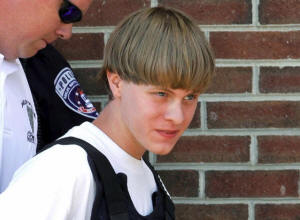|
U.S. seeking death penalty as trial
begins in South Carolina church shooting
 Send a link to a friend
Send a link to a friend
 [November 07, 2016]
By Harriet McLeod [November 07, 2016]
By Harriet McLeod
CHARLESTON, S.C. (Reuters) - The final
phase of jury selection begins on Monday in the U.S. death penalty trial
for a white man charged with federal hate crimes after the shooting
deaths of nine black parishioners at a historic South Carolina church
last year.
Dylann Roof, who is accused of holding white supremacist views, was
indicted on 33 federal counts of hate crimes, obstruction of religion
and using a firearm in a violent crime after he opened fire during a
Bible study session at Emanuel African Methodist Episcopal Church in
Charleston in June 2015.
The proceedings getting underway at the U.S. courthouse in Charleston
will unfold as another racially-charged trial progresses across the
street. Michael Slager, a white former police officer in North
Charleston, is being tried for murder in state court in the shooting of
black motorist Walter Scott in April 2015.
The two incidents, which occurred just two months apart, shook the
country and further intensified the debate over U.S. race relations.
In Roof's case, lawyers could take about two weeks to cull the remaining
potential jurors. More than 700 people filled out questionnaires about
the case when jury selection began in September, out of 3,000 summoned
for the trial. Twelve jurors and 6 alternates will hear the testimony.

If Roof is convicted, the penalty phase of the trial could extend into
January. Roof, 22, has offered to plead guilty if the death penalty was
dropped, court filings show.
He also faces a death sentence if found guilty of murder in state court
in a trial scheduled for next year.
Prosecutors say Roof planned the church attack for months, singling out
victims who were black and elderly, and showing no remorse. At the
federal trial, they plan to present racist manifestos that he
purportedly wrote in an effort to incite a race war.
[to top of second column] |

Police lead suspected shooter Dylann Roof into the courthouse in
Shelby, North Carolina, U.S. June 18, 2015. REUTERS/Jason
Miczek/File Photo

Roof's attorneys declined to comment ahead of the trial, and his
family has asked for privacy.
"We are still struggling to understand why Dylann caused so much
grief and pain to so many good people," the family said in a
statement last week.
Relatives of the victims have been divided on the decision to seek
capital punishment, after some tearfully offered words of
forgiveness during Roof's first court appearance.
The city plans an outpouring of support during the trial, with
restaurants donating daily lunches to family members attending
court.
"How they chose to respond to the tragedy made the difference," said
Helen Hill, executive director of the Charleston Convention and
Visitors Bureau. "They are a model of how you can truly bring about
long-lasting change."
(Additional reporting and writing by Letitia Stein; Editing by
Colleen Jenkins, Bernard Orr)
[© 2016 Thomson Reuters. All rights
reserved.]
Copyright 2016 Reuters. All rights reserved. This material may not be published,
broadcast, rewritten or redistributed.
 |